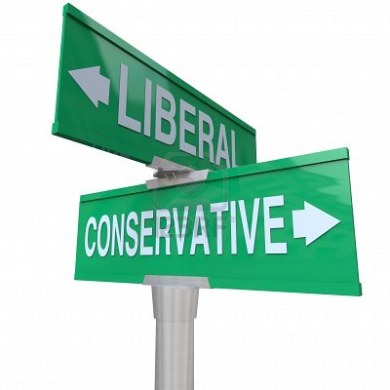On Facebook, among the many questions it asks is the question, “Politics” and they expect you to write, “Conservative, Moderate, or Liberal.” I answered it then, and would still answer it today, “A mix that is hard to label.” It is an honest response for me. I have some views that will match with one of the major political parties, some that match with the other, and some that match with neither (or more obscure parties). I don’t like to get labeled by choosing one party over the other.
A conversation today during Sunday School reinforced this to me. An elder expressed that he noted that in the PC(USA) that while traditionally the members of Presbyterian churches have been more conservative and their pastors more liberal, and that was ok. But what upsets him is that today he sees former pastors and other clergy on social media forums like Facebook posting things that he sees as derogatory to conservatives. I told him later that I have observed the same thing but that I frequently also find such clergy are often either retired or in specialized ministries where they don’t have congregations. This doesn’t make it right at all, but I think that’s where it comes from. I also believe some of the posts are likely in response to many emails over the years such pastors and specialized clergy have received that have been have been derogatory to their outlook or point of view. It isn’t just one side in the equation who has been rude. And of course, this difference in political outlook is not unusual to Presbyterians. Clergy in all denominations have tended to have different outlooks from the average members. But this isn’t a bad thing. It’s a good thing. And of course, nothing is universal. Despite tendencies, I know some very conservative pastors and some very liberal church members. And again, that’s a good thing too. I think it is sad when anyone, especially Christians, even inadvertently denigrate another for not sharing their views.
A fundamental belief that I hold is that there is strength in diversity. God makes us different, gives us different experiences, and most of all makes us to need each other. I know that I have grown by interacting with men and women, young and old, liberal and conservative, and even from people of different faith groups than my own. But, sadly, I think this is what is being lost on our larger society today. Too many people see others who have different beliefs from us as people to defeat in the grand battle of ideas. When I was growing up, I frequently heard people and commentators say that our nation and state are better off with a balance between the two major parties. But today, I see people either totally for one party or totally for the other and with little to nothing good to say about the other party. And, even worse, I see some churches pealing away from valuing diversity and instead seeking pastors, elders/deacons, members, and even denominations where everyone shares a similar outlook and background. We stunt our growth when we do this. We really deny God is there for all of us, is interacting with all of us, and loves all of us and instead mistakenly believe God is only for our group (whatever that group is). Did Jesus just keep around people of similar background and outlook with him? No, he didn’t. Instead, he did quite the reverse.
Do I have opinions in an election? Do I support one candidate over another? Do I follow what happens in Washington D.C. and in Baton Rouge? Sure I do. But I never want my personal ideas of what should or shouldn’t happen, in arenas far beyond my control and of which I only have so much information, to get in the way of my relationship with people. I think when we meet someone it should only be a slight interest to us whether they are a liberal or conservative, a Democrat or a Republican. What should interest us is what we can do together. And what should be far more important to us, especially in the church, is that if a person has come to church with us, then Jesus and his teachings are important to them, and that should make them important to us. And together, and maybe just in a small way, but maybe also in a big way, God has given us the opportunity to change the community around us for the better.
In an age of “us versus them” let us find common cause with people. And in the church, let us be one people, following our God who is One, and let us find strength in our diversity.
What do you think?
Until next time,
Tom

